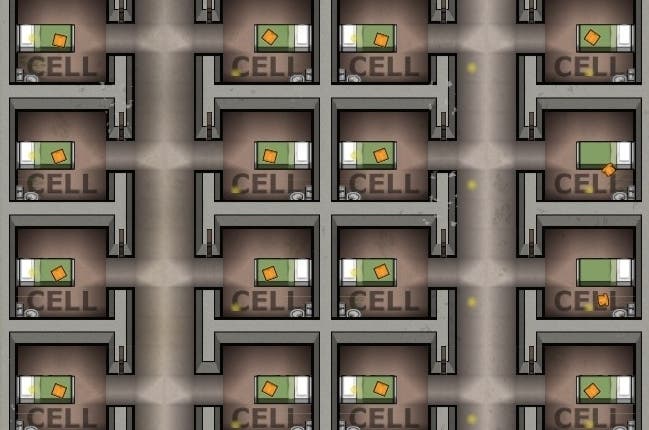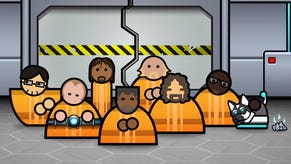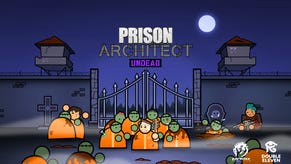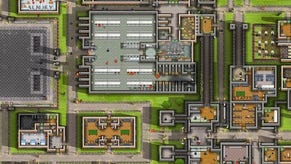Prison Architect alpha review
Only correct.
I can't tell you the names of any of my inmates in any of my prisons. The smallest holds a couple of dozen, the largest has over a hundred, crammed together like battery hens in a place whose only purpose is to provide effective and prolonged detention. Some are serving lengthy terms for very serious crimes, others wander free after just a few game hours within my walls. None of them make any kind of impression on my memory.
It's a shame, because they all have rap sheets and many have biographies. Each also has their own needs and desires, Sims-like requirements that include things like Recreation, Privacy and, of course, the ever-predictable call of the Bowels. But I don't look at this information. I don't care. What I care about is how many of these people there are, where they are, if they're following the procedures I've set up and what sort of disruption I might have to prepare for.
And this is the amazing thing about Prison Architect. I don't know if this is deliberate, I don't know if it was the intention of the creators that this be so but, even in its alpha state, even as an undirected sandbox experience that pops up error messages or sometimes turns prisoners into floating heads, all it makes me care about is whether the system works. The people inside the system become irrelevant, faceless and interchangeable.
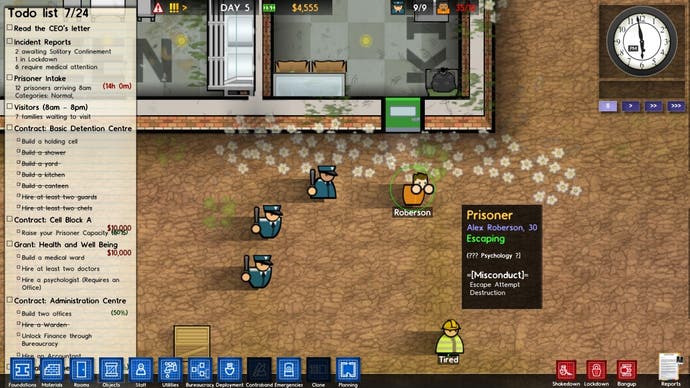
I run an institution. It is formed of estate and material that has value, while being populated by agents who either maintain it or who justify its existence by being the tenants it requires. The more of these tenants I house, the more money I receive in federal grants, so it's in my interest to house them as efficiently as possible. Who they are and what they have done is as relevant to me as mountain goats are to a whale.
Yes, I have become so alienated and abstracted from the individuals in my prisons that all that matters to me is the apparatus I have assembled and whether that apparatus works.
Very often, it doesn't.
For all its systems and themes of order and control, presenting you schedules and blueprints and patrol patterns, Prison Architect can quickly become a very chaotic affair. Most of the people inside a prison don't want to be there and a typical day provides them with a number of opportunities to effect their escape. Lunch crams them into a canteen where they threaten to form an unruly mob of overwhelming proportion, while the relative privacy of a cell can hide the sort of slow, methodical digging that an inmate has plenty of time for.
This means it can also be a difficult game, or at least a difficult game to play well, because disorder and disruption are never far away. Starting out is simple enough. Though the game's introduction leaves you a little short, avoiding many of the nuances of layout and process that you'll learn by fumbling your way through federal correction, getting a prison up and running isn't hard. The process of laying out your blocky, brutalist borstal, partitioning rooms and organising shifts is pleasingly straightforward. It's running a tight ship that's much harder.
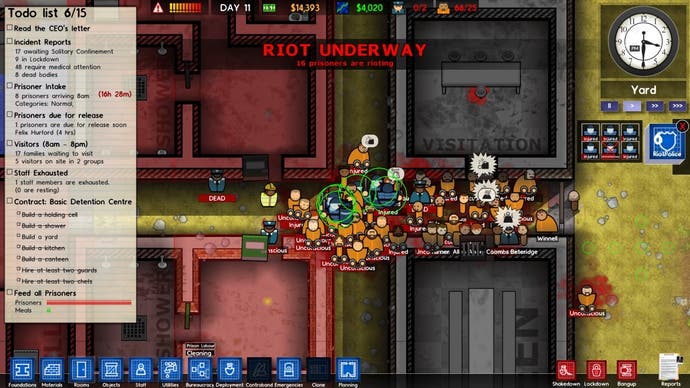
There you are, meticulously organising your space, building as many 2x3-metre cells as you can in a wing or adjusting the budget for dinner, when suddenly an inmate with a power tool bursts into the yard and tries to drill into your janitor's head. Prisoners have plenty of opportunities to secrete away things to help them escape or murder whoever has angered them, and while providing them with distractions or meaningful uses for their time is helpful, sometimes they will just do something crazy. Or nasty. Or violent.
Good management can reduce the number of holes being drilled into your tight ship (and your staff), but it'll never entirely stop moments like these. This is a good thing, because it's this sort of chaos that keeps you interested after you've spent a couple of hours filling out a sandbox map, stretching out your tech tree and wondering where to head next. It's also where the challenge is as, right now, there are few consequences to things going wrong, even horribly wrong.
For a prison warden, a worst-case scenario would presumably involve a riot or mass escape. These are certainly troublesome, but beyond whatever hit you take repairing the damage inflicted by rampaging inmates or replacing staff who expired performing their civic duty, there's not much more to do beyond tidying up and carrying on. No authority will bring justice, no organisation will chastise you for whatever happens within your walls. For you, prison architect, the punishments are only financial.
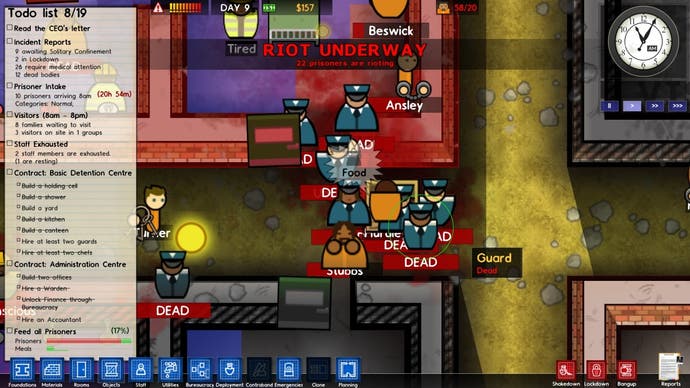
This won't stop you enjoying your constant struggle against chaos, and when the alarms sound and the inmates go wild it's more fun than it should be to call for the riot police and watch this team of professional pugilists pummel their way through corridors, showers, laundry rooms and all the other facilities you carefully arranged. While researching more concepts makes management easier, as an accountant balances your books and a doctor tends to the injured, it's finding more iron hands to put in iron gloves that proves most satisfying. A security chief opens up the possibility of armed guards, all-seeing CCTV to turn your prison into a panopticon, or dogs that are really, really good at catching people.
Occasionally you'll spot a confused, stranded figure stood apart from everything else; these lost souls are unable to path their way properly around your personal vision of purgatory. This most commonly happens to your workers, something that's particularly problematic because you usually need them to build a wall, fill a tunnel or make sure a toilet behaves like a toilet and not like a volcano. It's a pain and a particularly stubborn happenstance: the only way around it is to take down walls until you find whatever they believed was in their way, even though you're just as likely to see another worker walking through a wall moments later, nonchalant as can be.
Order execution is also rather haphazard - almost as unpredictable as your unhelpful inmates. Lay down a section of pipe, for example, and your workers might start building it from both ends, before stopping almost upon completion to go and perform another task that's entirely irrelevant, such as installing a lamp or fixing a broken drinks machine. The pipe will be finished later, likely halfway through another quite separate task.
"I went to check on some guests to find that my visitors were dead, my prisoners were dead and also my guards were dead. By Prison Architect's amoral logic, this was a problem that had already solved itself."
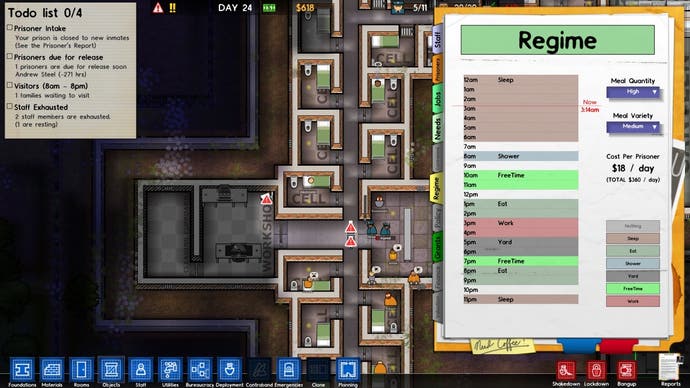
But there's a sort of wonder amongst all this chaos and I think, to some degree, Prison Architect wants to be a game about chaos anyway. Chaos against order, the free against the system. It produces ridiculous moments such as the post-riot repairs that had my workmen casually re-installing shower heads next to still-unconscious prisoners, or the time I went to check on some guests to find that my visitors were dead, my prisoners were dead and also my guards were dead. By the standards of Prison Architect's particularly amoral logic, this was actually a problem that had already solved itself. I needed to do nothing except wait for more of each to arrive.
So while I would say that what is most lacking in this Early Access version is a sense of direction and of consequence, which stunts its long-term appeal, Prison Architect is a game that already has a very particular character to it. The draw is in meticulous management, in watching things then go wrong, in tidying up afterwards and in secretly relishing the next opportunity to watch disaster unfold.
Well, that and containing people within the grey familiarity of a loveless marriage to repetition - a union whose immutable, concrete foundations are acceptance and acquiescence, whose only hope lies in violent revolution.
Let me put it another way: were you the sort of kid who liked building things up and watching them fall down? You might consider a career in corrections.
Eurogamer's alpha and beta reviews are reviews of games that are still in development but are already being offered for sale or funded by micro-transactions. They offer a preliminary verdict but have no score attached. For more information, read our editor's blog.
